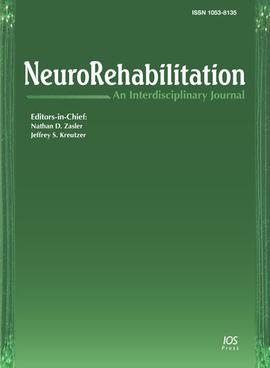NeuroRehabilitation
NeuroRehabilitation is a medical process aimed at aiding recovery from nervous system injuries, and to minimize and/or compensate for any functional alterations resulting from it. This field combines the expertise from various medical and therapeutic disciplines to design and implement a comprehensive rehabilitation plan for individuals who have suffered from neurological disorders such as stroke, traumatic brain injury, spinal cord injury, and multiple sclerosis, among others.
Overview[edit | edit source]
NeuroRehabilitation works by applying the principles of neuroplasticity, which is the brain's ability to reorganize itself by forming new neural connections throughout life. This ability allows the brain to adjust its activities in response to new situations or changes in the environment, a fundamental aspect in the recovery of neurological functions.
The process of NeuroRehabilitation is multidisciplinary, involving a team of health professionals including but not limited to neurologists, physiatrists (rehabilitation physicians), physical therapists, occupational therapists, speech and language therapists, and clinical psychologists. This team works together to create a tailored rehabilitation program that addresses the specific needs and challenges of the individual patient.
Techniques and Therapies[edit | edit source]
NeuroRehabilitation encompasses a wide range of techniques and therapies aimed at improving function, including:
- Physical Therapy: Focuses on improving motor functions, strength, balance, and coordination.
- Occupational Therapy: Aims to enhance the patient's ability to perform everyday activities and promote independence.
- Speech and Language Therapy: Helps individuals recover communication skills and addresses swallowing difficulties.
- Cognitive Rehabilitation: Targets cognitive functions such as attention, memory, and executive functions to improve cognitive deficits.
- Assistive Technology: Involves the use of devices and software to support individuals in performing tasks that might otherwise be difficult or impossible.
Conditions Treated[edit | edit source]
NeuroRehabilitation is beneficial for individuals suffering from a variety of neurological conditions, including but not limited to:
- Stroke
- Traumatic Brain Injury (TBI)
- Spinal Cord Injury
- Multiple Sclerosis (MS)
- Parkinson's Disease
- Cerebral Palsy
Goals[edit | edit source]
The primary goals of NeuroRehabilitation are to:
- Enhance and maximize neurological recovery.
- Improve functional abilities and quality of life.
- Reduce symptoms and complications.
- Promote independence and social reintegration.
Challenges and Future Directions[edit | edit source]
Despite its benefits, NeuroRehabilitation faces several challenges, including the need for personalized treatments, the high costs associated with long-term rehabilitation, and the lack of access in certain regions. Future directions in the field may include the integration of technology such as virtual reality and robotic-assisted therapy, which have shown promise in enhancing rehabilitation outcomes.
Search WikiMD
Ad.Tired of being Overweight? Try W8MD's physician weight loss program.
Semaglutide (Ozempic / Wegovy and Tirzepatide (Mounjaro / Zepbound) available.
Advertise on WikiMD
|
WikiMD's Wellness Encyclopedia |
| Let Food Be Thy Medicine Medicine Thy Food - Hippocrates |
Translate this page: - East Asian
中文,
日本,
한국어,
South Asian
हिन्दी,
தமிழ்,
తెలుగు,
Urdu,
ಕನ್ನಡ,
Southeast Asian
Indonesian,
Vietnamese,
Thai,
မြန်မာဘာသာ,
বাংলা
European
español,
Deutsch,
français,
Greek,
português do Brasil,
polski,
română,
русский,
Nederlands,
norsk,
svenska,
suomi,
Italian
Middle Eastern & African
عربى,
Turkish,
Persian,
Hebrew,
Afrikaans,
isiZulu,
Kiswahili,
Other
Bulgarian,
Hungarian,
Czech,
Swedish,
മലയാളം,
मराठी,
ਪੰਜਾਬੀ,
ગુજરાતી,
Portuguese,
Ukrainian
Medical Disclaimer: WikiMD is not a substitute for professional medical advice. The information on WikiMD is provided as an information resource only, may be incorrect, outdated or misleading, and is not to be used or relied on for any diagnostic or treatment purposes. Please consult your health care provider before making any healthcare decisions or for guidance about a specific medical condition. WikiMD expressly disclaims responsibility, and shall have no liability, for any damages, loss, injury, or liability whatsoever suffered as a result of your reliance on the information contained in this site. By visiting this site you agree to the foregoing terms and conditions, which may from time to time be changed or supplemented by WikiMD. If you do not agree to the foregoing terms and conditions, you should not enter or use this site. See full disclaimer.
Credits:Most images are courtesy of Wikimedia commons, and templates, categories Wikipedia, licensed under CC BY SA or similar.
Contributors: Prab R. Tumpati, MD

